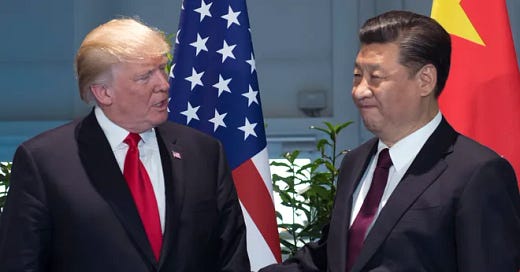Trump’s antics give Xi much to smile about but…
The world of international punditry is humming with speculation that China will assume the role of global leadership as President Trump’s wrecking ball does its worst to demolish America’s predominance in international affairs.
However the self-inflicted fall of one hegemon does not automatically lead to the rise of another especially when the other is a sclerotic dictatorship offering a smorgasbord of things not to like.
That said it is rather amusing seeing the Chinese dictatorship pose as the grown up in the room, pushing free trade, assuming the mantle of peacemaker and suddenly discovering a great love for international institutions.
Little of this is credible given the People’s Republic of China’s (PRC’s) record of erecting formidable barriers to access its market. As for speaking of peace while providing the means for Russia to prolong its war on Ukraine, ‘nuff said and gimme a break over China’s newly discovered great love of international bodies.
And yet, compared with the craziness coming out of the White House, the PRC, an economic powerhouse, can appear to be in pole position to replace America as the world’s hegemon.
Moreover China’s clash with America plays very well at home where the Communist Party has crafted a history of grievance with foreign powers to justify the nature of the regime.
And the PRC stands to benefit overseas from the Trump mess, especially in the South where it’s influence is already strong and US policies are creating real hardship.
China’s problem is that in countries where the leadership has enthusiastically embraced Beijing, the people they rule have proved to be far less enamored.
During the Mao era, when China was largely closed to the rest of the world, it exerted great influence on countries struggling for independence and seeking to establish varying types of a new socialist order. Students were sent to the PRC from Africa and found themselves confronted with naked racism.
And while China burnished its Third World credentials its influence never reached the grass roots in the way that American culture and way of life so entranced people around the globe.
Today, where the PRC’s influence is greatest, notably in nations signed up to the Belt and Road project, linking great swathes of the world with Beijing, Chinese officials and companies working along this highway have a habit of being wholeheartedly detested by the people on the ground. In Cambodia, increasingly under the PRC’s thumb, resentment against the Chinese is palpable. And across Africa and Latin America where China has been busy handing out cash for mega-projects, there is a dawning recognition that the terms being exerted are ruinous and the real value of some of these schemes is dubious for the host nations but very much in accord with the PRC’s global objectives.
Meanwhile Beijing finds it very hard to get on with its neighbors. On the one hand it is becoming increasingly aggressive towards Taiwan while on the other, it has already gone to war with neighboring Vietnam, which gave China a bloody nose and in India, sporadic fighting has given way to a prolonged uneasy peace.
China is straining every sinew to bolster its military might but what scares the Chinese Communist Party most are its own people which is why it consistently spends more on internal security than on defense. A nation compelled to devote so much of its resources to keeping its own people under control is not half as mighty as it wishes to appear.
Moreover people are still queuing up to live in the world’s democracies, while China’s lure is notably weak, indeed many of its brightest and best people have moved overseas.
At the cultural level China’s influence is also weak. South Korea, a far smaller Asian nation, has a far larger impact on global popular culture. Japanese companies have created truly impressive world leading brands while Chinese companies compete best by being cheap. Even in hi-tech development, where Chinese advances are truly impressive, progress is always subject to the whims of a Communist Party that values control over all else.
To be a true superpower requires more than alliances forged at the top but also profound engagement with the citizens below, where this is absent superpower status is likely to be ephemeral.
So things are not exactly going to plan for Beijing. Nor is the Trump eruption on track to get the rest of the world to cower as liberal political forces are bolstered as Trumps closest supporters are damaged. A case in point being the defeat of conservative parties in recent Canadian and Australian elections. European nations, derided as soft and irredeemably Socialist by Trump surrogates, are drawing closer together, even Britain is joining in.
But they are not drawing closer to China because Europeans are wary of snuggling up to a nation which practices genocide at home while undertaking wholesale espionage in their backyards.
What this suggests is that the vacuum created by America’s mid-life crisis will not lead to the emergence of another hegemon to fill its big boots but that power will be defused; alliances ‘of the willing’, as Keir Starmer describes them, will become more active.
The reality is that China does not even have a freely convertible currency, its borders are sealed both with weaponry and the great information firewall which prevents free communication. Its leaders have reverted to a fervid brand of nationalism which plays well at home but by definition can hardly be attractive to anyone else.
When Martin Jacques, an excitable Beijing supporter, published his book ‘When China Rules the World’ in 2009, his argument was fundamentally flawed – almost two decades on it remains so.
Subscribers to this Substack are welcome to give this special audio book offer a go
Written By: Stephen Vines
https://www.audiobooks.com/promotions/promotedBook/569962/defying-the-dragon-hong-kong-and-the-worlds-largest-dictatorship?





